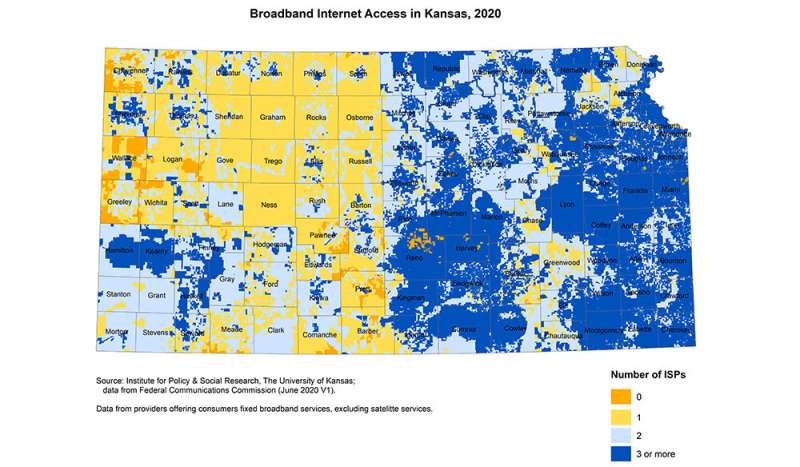This article has been reviewed according to Science X's editorial process and policies. Editors have highlighted the following attributes while ensuring the content's credibility:
fact-checked
trusted source
proofread
Research on broadband in Kansas recommends statewide strategy to improve infrastructure

University of Kansas researchers have completed a two-year study of broadband access in Kansas. Their newly published report, "Broadband in Kansas: The Challenges of Digital Access and Affordability," documents extensive challenges within the current broadband landscape in the state and recommends a comprehensive strategy to address these challenges.
The research showed low levels of satisfaction across Kansas with current internet access and cost. The research team identified areas throughout the state where the only available internet is poor or there is no available internet connection. In addition, people living in areas with inadequate or inconsistent internet service often pay high financial and time costs for this service.
These gaps in broadband coverage limit the economic growth of the state, and they reflect a failure of the existing market to provide an essential service, according to the researchers.
Further, many Kansans live in regions with only a single service provider. This lack of competition is associated with higher prices, lower speeds and lower satisfaction, according to the report.
The KU-led research team also described a divide in the digital literacy skills and tech support of Kansans based on field observations of people who use publicly available computers and internet at libraries. As society becomes more reliant on web-based information, forms and resources, it is increasingly critical that people have ways to access and utilize those resources. In addition to computer and internet access in public spaces, researchers noted the importance of support for digital literacy in these spaces.
In light of the market failure to provide high-quality broadband access across Kansas and to ensure people have the skills and resources they need in an increasingly digital world, the research team strongly recommended a comprehensive strategy for the state.
"The goal of our report was to understand where there were shortcomings in service in order to guide future investments in broadband. Our speed tests and survey have provided some useful information to the Office of Broadband Development as it uses federal resources to address state broadband needs," said Donna Ginther, principal investigator of the study, Roy A. Roberts and Regents Distinguished Professor of Economics, and director of KU's Institute for Policy & Social Research.
Study participants compared broadband access in Kansas to the electrification of the state, which required significant investments from the federal government. "Flipping the switch" on electricity led to drastic improvements in quality of life and economic growth. Study participants repeatedly told the team that affordable, high-speed internet access across Kansas would lead to similar improvements in quality of life and economic opportunity.
The state of Kansas recently established an Office of Broadband Development. That office—if funded adequately—could become a clearinghouse for information about broadband needs, funding that can help meet these needs and initiatives to foster partnerships and improve connectivity and technology skills, according to the researchers. The office also could lead the development and implementation of a strategy to improve access across Kansas and identify ways to ameliorate digital divides.
"In addition to challenges, we also found pockets of opportunity for Kansas to be particularly innovative in providing more universal access and digital equity across the state," said co-investigator Germaine Halegoua, John D. Evans Development Professor & Associate Professor of Communication and Media at the University of Michigan. "Right now, there are several different private and public entities working on providing internet access in unserved and underserved areas, receiving state and federal funds, collecting data on Kansas broadband, and that have ideas and resources to share—but they don't always know about each other or work together. A well-supported broadband office to continually collect, coordinate, curate and foster these efforts is a valuable foundation."
The study included a speed test, surveys, interviews, focus groups and field observations. The team collected data from Kansas residents, including people from urban, rural and urban-adjacent communities, with a range of income, technology skills and internet needs. The research team also worked with internet service providers in Kansas, state and local government representatives, and industry organizations invested in seeing significant improvements in the Kansas broadband infrastructure.





















